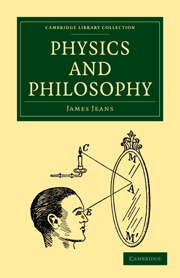Book contents
- Frontmatter
- Contents
- Preface
- I What are Physics and Philosophy?
- II How do we know? (Descartes to Kant; Eddington)
- III The two voices of Science and Philosophy (Plato to the present)
- IV The Passing of the Mechanical Age (Newton to Einstein)
- V The New Physics (Planck, Rutherford, Bohr)
- VI From Appearance to Reality (Bohr, Heisenberg, de Broglie, Schrödinger, Dirac)
- VII Some Problems of Philosophy
- Index
I - What are Physics and Philosophy?
Published online by Cambridge University Press: 07 September 2010
- Frontmatter
- Contents
- Preface
- I What are Physics and Philosophy?
- II How do we know? (Descartes to Kant; Eddington)
- III The two voices of Science and Philosophy (Plato to the present)
- IV The Passing of the Mechanical Age (Newton to Einstein)
- V The New Physics (Planck, Rutherford, Bohr)
- VI From Appearance to Reality (Bohr, Heisenberg, de Broglie, Schrödinger, Dirac)
- VII Some Problems of Philosophy
- Index
Summary
Science usually advances by a succession of small steps, through a fog in which even the most keen-sighted explorer can seldom see more than a few paces ahead. Occasionally the fog lifts, an eminence is gained, and a wider stretch of territory can be surveyed—sometimes with startling results. A whole science may then seem to undergo a kaleidoscopic rearrangement, fragments of knowledge being found to fit together in a hitherto unsuspected manner. Sometimes the shock of readjustment may spread to other sciences; sometimes it may divert the whole current of human thought.
Events of this last kind are rare, but instances come readily to mind. We are likely to think first of the results of replacing the geocentric astronomy of mediaeval times by the Copernican system—man saw that his home was not the majestic fixed centre of the universe round which all else had to revolve, but one of many fragments of matter which were themselves revolving round a very ordinary one of the myriads of stars in the sky. Or we may think of the implications of the Darwinian biology—man saw that his body had not been specially designed for himself, the lord of creation, but was an adaptation and development of the bodies of animals which had preceded him on earth, and were in fact his own ancestry; all terrestrial creatures, even the meanest, proved to be his bloodrelations, and if he had dominion over them it was only because he happened to have been born into the clever branch of the big family.
- Type
- Chapter
- Information
- Physics and Philosophy , pp. 1 - 31Publisher: Cambridge University PressPrint publication year: 2009First published in: 1942



